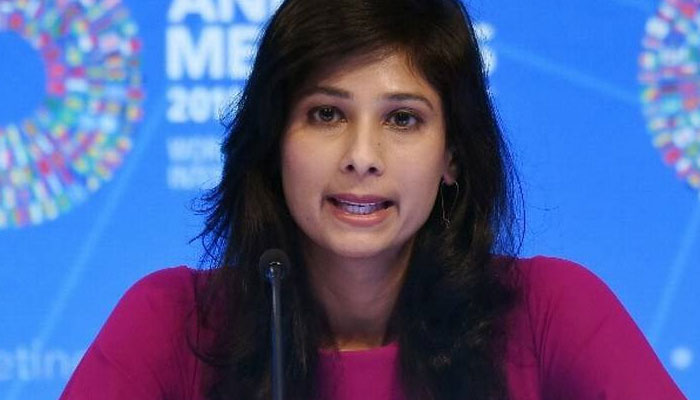IMF official sees energy prices spiralling down by early 2022
The IMF official said weather will play a factor in energy prices, since a very severe winter could lead to broader power outages "that will have a much bigger effect on the world
WASHINGTON: Rising energy prices are weighing on households but the recent spike is unlikely to fuel a 1970s-style oil crisis and should retreat early next year, IMF chief economist Gita Gopinath told AFP Tuesday.
Energy prices collapsed last year amid the shutdowns imposed to contain the Covid-19 pandemic, but 2021 has brought a sharp rebound in demand as the global economy recovered, Gopinath said in an interview.
In the energy market, a long, cold winter followed by a particularly hot summer led to greater demand and depleted stocks, especially gas reserves in Europe.
"This recovery is really quite unique," she said, speaking on the sidelines of the annual meetings of the International Monetary Fund and World Bank.
Supplies of many other goods have not been able to rebound as quickly as demand, hampered in part by the spread of the Delta variant of Covid-19, which has made workers reluctant to return to their jobs and snarled supply chains.
Those labor shortages are "feeding into price pressures" in countries like Germany, the United States and Japan, she said.
"We are in a difficult situation where we've seen prices go up very sharply," and the key question is whether that will persist, she said.
- Worst case scenario? -
While energy prices "will be elevated" for the next couple of months, "We expect that to come back down by the end of the first quarter next year and into the second quarter," she said.
"Once we get past the winter months, we will be in a better place."
Oil prices have soared in recent weeks, jumping to multi-year highs on Monday, with the benchmark WTI crude jumping above $80 a barrel for the first time since October 2014 and up 30 percent since August, which sent major stock markets tumbling.
The increase in energy prices has ramped up fears that overall inflation could tick even higher and hinder the global economic recovery.
Gopinath cautioned that the weather will play a factor, since a very severe winter could lead to broader power outages "that will have a much bigger effect on the world."
The worst outcome would be "an extremely severe winter in the Northern Hemisphere," driving up demand for energy, combined with a failure of producers including the OPEC+ to respond with increased output, which could feed into headline inflation, she said.
In February 2021, severe weather marked by polar temperatures and snowstorms caused a surge in electricity consumption in the southern United States.
Texas, with a population of nearly 29 million, was unable to meet the explosion in demand, and blackouts affected hundreds of thousands of homes.
However, Gopinath does not expect a crisis like the one seen in the 1970s because the world relies much less on energy relative to the size of the economy.
"It would take a much bigger ratcheting up in gas prices, for instance, to have a kind of a stagflationary event," she said, referring to the economic crisis in the 1970s when inflation spiraled due to high oil prices as growth stalled.
The IMF's latest forecasts call for inflation to return to pre-pandemic levels by the middle of 2022, but warn of "high uncertainty" and upside risks in the United States.
-
Bitcoin crashes below $63K as regulatory pressure and market fears grow
-
Bitwise Crypto Industry innovators ETF: What investors should do in 2026?
-
Nintendo shares slide again as momentum fears grow
-
Gold, silver prices fallen sharply; What’s driving the drop?
-
Gold’s record climb: Experts question if its safety is ‘overstated’
-
Dubai unveils plans to construct street built with real gold
-
Netflix slams Paramount’s bid: 'Doesn't pass sniff test’ as Warner battle escalates
-
Ubisoft: Shares plunge amid restructuring plan and wave of games cancellations












